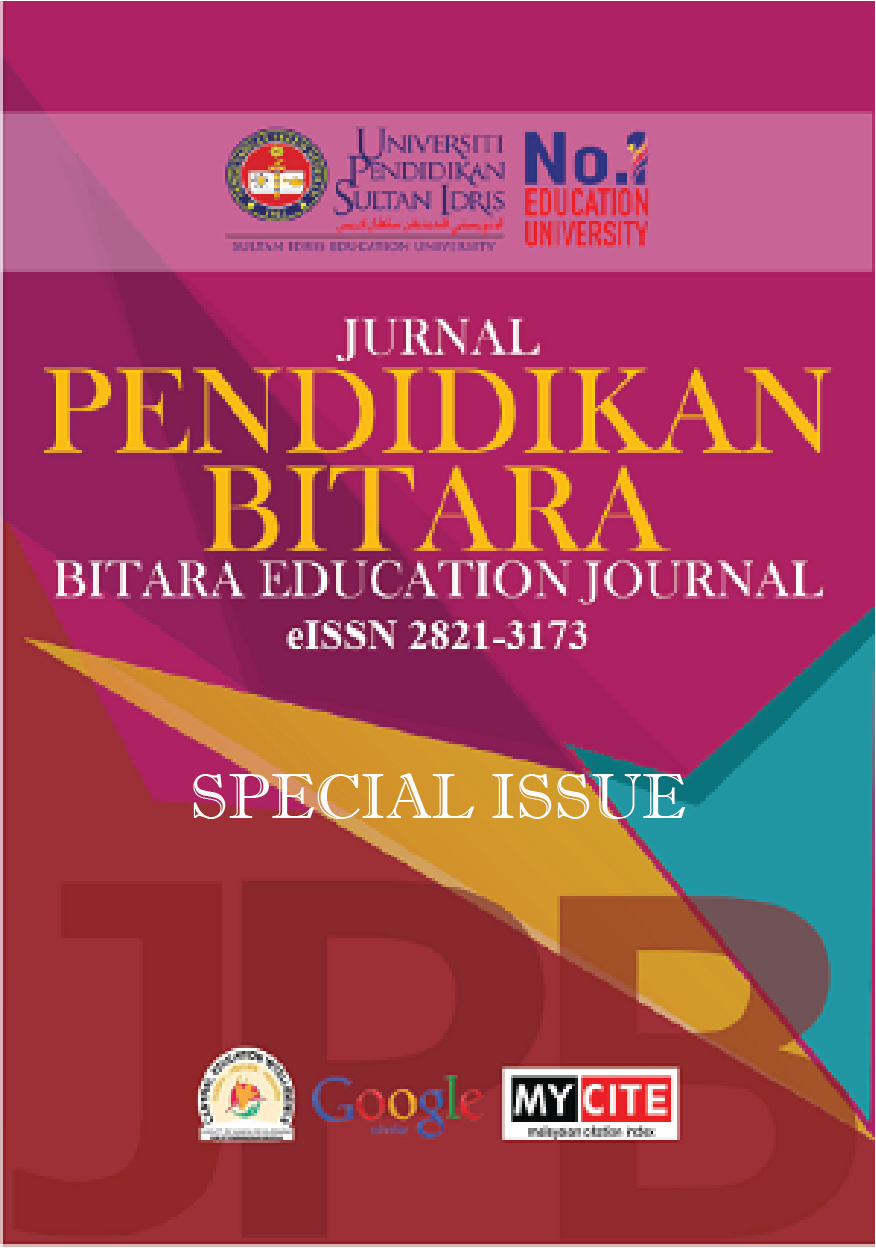Planning in Enhancing Higher Order Thinking Among Science’s Students: The Future of Green Technology
DOI:
https://doi.org/10.37134/bitara.vol14.sp.12.2021Keywords:
Green technology, HOTS, Higher Order Thinking, STEMAbstract
The initiatives of green technology module through curriculum is an anticipated outcome of the continuous integration of Science, Technology, Engineering and Mathematics (STEM) into the syllabus of educational curriculum in schools. This attempt is among the accomplishments by the Ministry of Education in promoting enthusiasm and engagement of students in STEM. Critical thinking, innovating thinking, problem solving and scientific thinking are the components that should be present in STEM education to build up students’ higher order thinking skills (HOTS). In this concept paper, green technology implementation along the process of learning which could build up students’ thinking skills is discussed. According to the literature, there are problems that arise due to the lack of understanding to implement green technology that would eventually impact STEM education. Nevertheless, in implementing it, numerous aspects and disputes have to be put into consideration. In this study, the researchers will find practical strategies that are usable in building up higher order thinking skills of students in which they will experience a number of hands-on green projects.
Downloads
References
Abdullah.M. (2012). The soft skills education for the vocational graduate: Value as work readiness skills, British Journal of Education, Society & Behavioural Science, 326–338. http://doi.org/10.9734/BJESBS/2012/1858
Arasinah, K., Ramlee, M., Waliza, A. W., & Bushra Limuna, I. (2016). Green Skills as an added-value element in producing competent students. Int. Journal of Engineering Research and Application, 6(11), 12–21.
Azmi FR, Musa H, Shahbodin F, et al.(2017). Implementation of green human resource management in Malaysia. in Proceedings of Mechanical Engineering Research Day, 257–258.
Baharin, N., Kamarudin, N., & Manaf, U. K. A. (2018). Integrating STEM Education Approach in Enhancing Higher Order Thinking Skills. International Journal of Academic Research in Business and Social Sciences. https://doi.org/10.6007/ijarbss/v8-i7/4421
Barak, M., & Assal, M. (2018). Robotics and STEM learning: students’ achievements in assignments according to the P3 Task Taxonomy—practice, problem solving, and projects. International Journal of Technology and Design Education. https://doi.org/10.1007/s10798-016-9385-9
Brown, M. (2013). The development of green skills through the local TAFE Institute as a potential pathway to regional development. International Journal of Training Research, 11(1), 27-43
Carbonel, L. G., Adora, M. B., & Agbisit, I. C. (2015). Global environmental issues awareness and the perceived remedial measures. International Journal of Advanced Research in Management and Social Sciences, 4(11), 148-161.
CEDEFOP. (2012). Green skills and environmental awareness in vocational education and training: Synthesis Report,
Chan ESW, Hon AHY, Chan W, et al. (2014). What drives employees’ intentions to implement green practices in hotels? The role of knowledge, awareness, concern and ecological behaviour, Int. J. Hosp. Manag; 40: 20–28.
Colijn B., (2014). Green jobs in Europe and the increasing demand for technical skills, NEUJOBS Working Paper No. Deliverable D4.2. http://www.neujobs.eu/sites/default/files/publication/2014/02/Neujobs_Del4.2_270120 14%20.pdf.
Fien.J, and Guevara J.R., (2013). Skills for a green economy: Practice, possibilities, and prospects, Technical and Vocational Education and Training. Issues, Concerns and Prospects, 19, 255-263.
Horvatinčić, K., Demonja, D., & Tišma, S. (2016). Green Jobs for Green Food: New Knowledge and Skills for Family Farms in Food Production in Croatia. Quality - Access to Success, 17(154), 80– 84.
Ifegbesan, A. (2010). Exploring secondary school students understanding and practices of waste management in Ogun State, Nigeria. International Journal of Environmental and Science Education, 5(2). 201-215.
Kamis, A., Rus, C. R.,Rahim, M. B., Yunus, N., Amin, F., Zakaria, N., & Afandi, M. H.(2017). Exploring green skills: A study on the implementation of green skills among secondary school students. International Journal of Academic Research in Business and Social Sciences, 7(12), 327- 345.
KPM. (2011). Pelan strategik transformasi pendidikan vokasional. In Malay. http://www.bptv.edu.my/v4/images/bahanpdf/pelanstartegiktpv/Pelan Strategik Transformasi Pendidikan Vokasional_1.pdf, [accessed 3 May 2020].
Lee T.J., Kamarudin N., Talib O., Hassan A. (2016). How Does Inquiry-Based Instruction Affect Learning in a Secondary School Science Class? In: Teh G., Choy S. (eds) Empowering 21st Century Learners Through Holistic and Enterprising Learning. Springer, Singapore.
Maclean, R., Jagannathan, S., & Panth, B. (2018). Education and skills for Inclusive Growth, Green Jobs and the Greening of Economies in Asia–Case Study Summaries of India, Indonesia, Sri Lanka and Viet Nam. Asian Development Bank.
Mass, W., Moss, P., ' Brien, P., Novak, V., & Cavell, M. (2012). Skills for green jobs in the United States, International Labour Orginazation. ISBN: 9789221239932 (we pdf). http://www.ilo.org/pubins
Mohd Najid, N., Kiong, T. T., Che’ Rus, R., & Budiman, H. (2019). A Needs analysis on the development of problem based learning module for the microcontroller subject at Vocational College. Asian Journal of Assessment in Teaching and Learning. https://doi.org/10.37134/ajatel.vol9.no2.6.2019
Pavlova M., and Huang C. L., (2013). Advancing Employability and Green Skills Development: Values Education in TVET, the Case of the People‟s Republic of China, In Skills development for inclusive and sustainable growth in developing AsiaPacific Technical and Vocational Education and Training. Issues, Concerns and Prospects, 18, 2013, 327-343. http://download.springer.com/static/pdf/487
Raudsepp, M. (2001). Some socio-demographic and socio-psychological predictors of environmentalism. TRAMES, 5(4), 355-367.
Rattan,G. K., Librarian, A., Kahn, B., & Nabha, S. (2016). Asian Journal of Multidisciplinary Studies. Asian Journal of Multidisciplinary Studies ISSN:, 4(2), 35-41.
Vygotsky, L. S. (2012). The science of psychology. Journal of Russian and East European Psychology, 50(4): 85–106.
Wahono, B., Lin, P. L., & Chang, C. Y. (2020). Evidence of STEM enactment effectiveness in Asian student learning outcomes. International Journal of STEM Education. https://doi.org/10.1186/s40594-020-00236-1
Zakaria, N., Rahim, M. B., Rus, R. C., Kamis, A., Affandi, H. M., & Yunus, F. A. N. (2018). Exploring Green Skills: A study on the implementation of green skills among secondary school students. International Journal of Academic Research in Business and Social Sciences, 7(12), 327-345.
Zuhair, M. A. Z. (2015), Tahap kesedaran teknologi hijau dalam kalangan guru-guru kejuruteraan zon utara, In Malay. Master Thesis, Univeristy Tun Hussein Onn.Malaysia.





